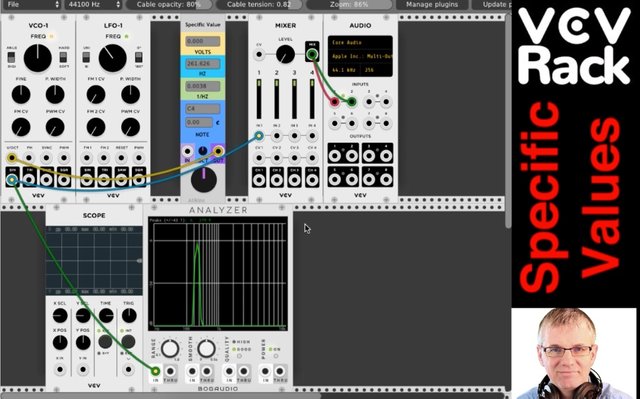Learn how to use Alikins' Specific Value for VCV Rack.
What Will I Learn?
- You will learn about the functionality of Alikins' Specific Value module
- You will learn the functionality of the In and Out
- You will learn how to interpret the variables of Volts, Hz, and Note
- You will learn how to manipulate all variables
- You will learn of a bug in the software and of the idiosyncrasies of the software

Requirements
To complete this tutorial learners will need to have the following:
- VCV Rack installed
- Alikin's module pack installed
Difficulty
This tutorial is at a beginner level.
Description

Learn about the functionality of Alikins' Specific Value module
There is no written user information about this module. Therefore, all functionality has had to be investigated and interpreted for this tutorial.
The Specific Value module has two main functions: 1. To display the incoming voltage and frequency values from a control voltage external source and 2. To manipulate outgoing control voltage values as they are passed to an external module.
Learn the functionality of the In and Out
This In port on the Specific Value module can be a 'thru' for control voltage. This means that an incoming control voltage signal can pass directly through the module with no change to the voltage. In this case the module just shows various information about the incoming control voltage as it passes through.
The Specific Value module can also alter the incoming control voltage if the user chooses to do so. By manipulating the controls and values of the module the incoming control voltage will be changes before it is sent to the Out port.
The displays and controls of this module provides users with specific information about the voltage, frequency and notes on the incoming and outgoing stream.

Learn how to interpret the variables of Volts, Hz, and Note
Specific Value has three information displays: Volts, Hz, and Note.
Volts provides us with the exact voltage of the incoming and outgoing control voltage. If no changes are made to this value then the module is displaying the incoming control voltage, which is also the outgoing voltage level. If changes are made to the Volt value in the module then the number represents the outgoing voltage level.

As with the Volts display, the Hz display shows the incoming data. Hz represents the frequency of the control data in cycles per second. The parameters surrounding the incoming and outgoing Hz follows the same pattern as the Volts display.

The Note display represents 2 variables: The pitch with the associated octave and the cents of the tuning.
The note display represents the closest diatonic pitch to the control voltage frequency. The Cents variable is the deviation from the closest diatonic pitch. Both these variables follow the same incoming and outgoing pattern as Volts and Hz.

As mentioned earlier, there is no user documentation for this module. Therefore, the function of 1/Hz display is unknown at this time.

Learn how to manipulate all variables
All variable displays can be manipulated by entering appropriate values into the text window and pressing Enter/Return. Please refer to "Bug and Idiosyncrasies" section of this document for details on how to enter values.
Learn of a bug in the software and of the idiosyncrasies of the software
Specific Value has a bug in the Oct or Octave dial. The dial is intended to change the frequency produced by the module by octaves up and down. The dial alters the values shown on the module, but does not reflect these changes in the frequency output. The output frequency stays the same no matter where the dial is places.
When entering a note value into the Note window you must use capital letters. Using lower case letter will make no change to the module.
When entering values in any of the windows you must use the delete/backspace key before entering new values. You can also use Command-A or Crtl-A before typing a new value as well.
I hope you enjoy this tutorial. If you have any specific questions for me feel free to leave it in the comments of this post and I will do my best to get back to you with an answer.
Cheers,
Video Tutorial
Curriculum
Learn VCV Rack Modular Synthesis Series

If you would like to learn how to use the open source modular synthesis DAW VCV Rack then have a look at these tutorials:
Click here for @buckydurddle's guide to VCV Rack
Learn MuseScore2 Series
Learn Hydrogen Drum Machine Series

If you would like to learn how to use the open source drum machine Hydrogen then have a look at these tutorials:
Click here for @buckydurddle's guide to Hydrogen
Learn Helm Series

If you would like to learn how to use the open source sound software synth Helm then have a look at these tutorials:
Click here for @buckydurddle's guide to Helm
Learn Audacity Series

If you would like to learn how to use the open source sound recording and editing software Audacity then have a look at these tutorials:
Click for @buckydurddle's Guide to Audacity
Logo - http://tytel.org/helm
Logo - https://www.audacityteam.org/
Logo - http://www.hydrogen-music.org/hcms/
Logo - https://www.vcvrack.com
Logo - https://www.blender.org
Posted on Utopian.io - Rewarding Open Source Contributors
Thank you for the contribution. It has been approved.
You can contact us on Discord.
[utopian-moderator]
Downvoting a post can decrease pending rewards and make it less visible. Common reasons:
Submit
Thanks @rdvn
Downvoting a post can decrease pending rewards and make it less visible. Common reasons:
Submit
Hey @rdvn, I just gave you a tip for your hard work on moderation. Upvote this comment to support the utopian moderators and increase your future rewards!
Downvoting a post can decrease pending rewards and make it less visible. Common reasons:
Submit
How are you converting voltage to pitch? An oscillator? What oscillator are you using?
Downvoting a post can decrease pending rewards and make it less visible. Common reasons:
Submit
Hello @banota. Yes I am using an oscillator. I am using the Fundamentals' VCO-1, but this module will work with any oscillator. Thanks for your question.
Downvoting a post can decrease pending rewards and make it less visible. Common reasons:
Submit
Hey @buckydurddle I am @utopian-io. I have just upvoted you!
Achievements
Community-Driven Witness!
I am the first and only Steem Community-Driven Witness. Participate on Discord. Lets GROW TOGETHER!
Up-vote this comment to grow my power and help Open Source contributions like this one. Want to chat? Join me on Discord https://discord.gg/Pc8HG9x
Downvoting a post can decrease pending rewards and make it less visible. Common reasons:
Submit